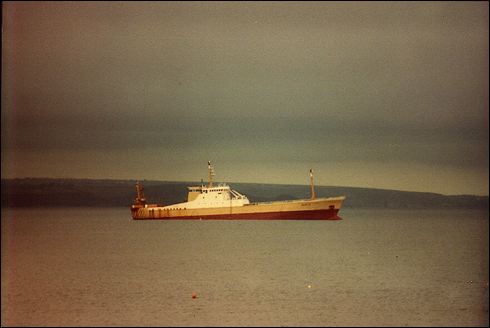 |
| Industrial freezer trawler |
In exceptionally sharp words, the United Nations' special rapporteur on food, Olivier de Schutter, said the interests of smaller fishermen, local communities and sustainable fishing were threatened by long-distance, industrial-scale trawling. "Future generations will pay the price when the oceans run dry."
Global fishing fleets should be cut drastically to ensure that stocks are not depleted, De Schutter told AFP.
"We must divide our capacity by half," he said, before concluding that fish farming should replace a large part of deep sea activity. "That is the only solution," De Schutter said. "'Ocean-grabbing,' in the shape of shady access agreements that harm small-scale fishers, unreported catch, incursions into protected waters, and the diversion of resources away from local populations, can be as serious a threat as 'land-grabbing,'" he said. "It is clear that as fish are becoming less abundant, fishing vessels are tempted to evade rules and conservation strategies... without rapid action to claw back waters from unsustainable practices, fisheries will no longer be able to play a critical role in securing the right to food of millions."
De Schutter made the remarks as he unveiled a new report on the world's fishing industries.
"Land-grabbing" is a term coined by green campaigners for the purchase or leasing of tracts of arable land in Africa by companies in Europe, the Middle East and China. Some of these firms are accused of exhausting the soil, depleting water resources and exploiting local labour in order to provide food for a lucrative market back home. De Schutter said fish provided 15 percent of all animal protein consumed worldwide, a figure that reaches 50 percent in parts of West Africa.
Fisheries and aquaculture directly employ 54.8 million people worldwide, and another 150 million people indirectly. International trade was worth $102 billion (79.06 billion euros) in 2010. But the sector is being badly damaged by over-trawling at sea, while aquaculture, which accounts for 63 million tonnes of fish, faces environmental challenges on shores, lakes and rivers, he said. Between 10 million and 28 million tonnes out of a global annual trawled catch of 78.9 million tonnes are illegal and some 7.3 million tonnes discarded.
The blame lies mainly with "licence and access agreements" by which countries allow long-distance industrial trawlers to scoop up fish, he said. Many of these accords are weak, for they fail to scrutinise illegal or unreported catch, turn a blind eye to exploited labour, abuse the fishery's sustainability limits and ignore the interests of small-scale local fishermen, said De Schutter. "Industrial fishing in far-flung waters may seem like the economic option, but only because fleets are able to pocket major subsidies while externalising the costs of over-fishing and resource degradation," said De Schutter.
Fish farming presents challenges of its own, he noted, including potential damage to local ecosystems and water pollution. UN figures show that at present, industrial and artisanal fishing each account for around 30 million tonnes of fish for human consumption per year, with industrial fishing employing 500,000 people and artisanal fishing providing jobs for 12 million. Meanwhile, farming operations already provide 63 million tonnes of fish per year, while industrial fishing also accounts for 30 million tonnes used for flours and oils.
Fresh-water fishing provides another 11 million tonnes for human consumption. In terms of subsidies, industrial fishing receives the equivalent of 25-27 billion dollars per year, while artisanal operations receive between five and seven billion dollars, the UN data showed.
Story courtesy of France24.